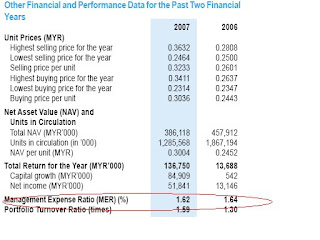We all learned standard deviation in our statics course during high school and we have solved a lot of math questions associated with this concept in classes. But do u know that it can be used as volatility measurement of any given portfolio. It served as important indication how risky one potential investment relative to another in consideration. Let's look at two hypothetical assets with 6 years annual gains. I guess majority of investor will choose Asset B. But let us examine further and calculate the standard deviation.

Asset A with standard deviation 9.52 is expected to be able to generate annual return between 3.48 (13 - 9.52) and 22.52 (13+9.52) wheres Asset B with standard deviation 29.44,32 is expected to be able to generate annual return between -14.44 (15-29.44) and 44.44 (15+29.44) in 2/3 of the time which approximately thirteen out of every twenty years. So obviously Asset B is more risky and volatile although Asset B have bigger average return. In fact, Asset B annualized return is 11% compare to almost 13% of Asset A. Another measurement that can be used to measure volatility is risk drag which have discussed in here.




